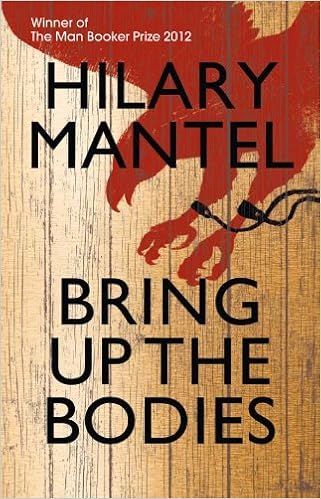'Strike first, before she strikes you. Remember how she brought down Wolsey.' His past lies about him like a burnt house. He has been building, building, but it has taken him years to sweep up the mess.
Second in the Thomas Cromwell trilogy: I wonder when the third volume will appear.
I didn't like this as much as Wolf Hall: it seemed overlong, a detailed examination of the fall of Anne Boleyn and the rise of Jane Seymour. There's more sense of the tightrope Cromwell is walking, of his precarious position as the man upon whom a notoriously temperamental monarch relies. He reflects on the notion that he is 'a man whose only friend is the King of England': he thinks, still, that he will see the end of Henry's reign. Indeed, when rumours of Henry's death at Greenwich reach Cromwell, it seems that he has outlasted the King. (One problem with historical novels, assuming they adhere to the facts: a great disaster for the characters is obviously, to the reader, a false alarm.)
Much of the novel concerns the whispering, machinations and back-biting of Henry's court, and especially of the miasma of women who surround his second queen, Anne Boleyn. Rumour and superstition do as much to topple Anne as her failure to produce a son, or her husband's preference for plain, virtuous Jane Seymour. It is Cromwell, however, who weaves together those fragments of gossip to bring about Anne's execution: and it is Henry's desire to dissolve the marriage that drives Cromwell's actions.
Cromwell is as isolated, himself, as Henry's England after the English Reformation. Most of Cromwell's family are dead: only his bright and curious son, Gregory, remains. The noblemen among who he moves -- not least the Duke of Norfolk and his circle -- look down on him as a commoner. He has, of course, no friends: though he finds himself missing Thomas More, and Wolsey. His whole life is devoted to Henry, and to Henry's will.
Mantel's writing is full of resonant images: that irritating 'he, Thomas' tic is still there, and sometimes seems unnecessary since it's Thomas Cromwell whose eyes we are seeing through. But, wait: who is the 'we' who (for instance) 'will not have many more days such as this'? Is this Mantel fostering a sense of unity? Or is it Thomas, emphasising his feeling of unity with his audience, or England, or the English, or the King with his 'royal we'?

No comments:
Post a Comment